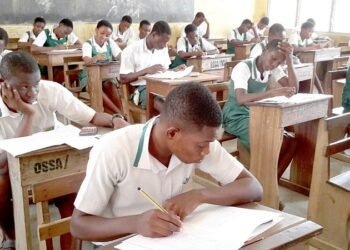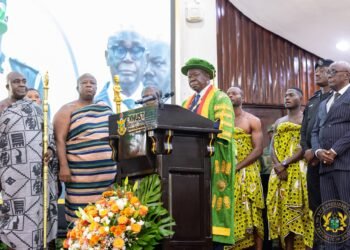The Director of Grievances and Negotiations Prof. Charles Adabo Oppong has addressed the ongoing negotiations regarding the College of Education Teachers Association of Ghana (CETAG) and their potential strike action.
He elaborated on the complexities involved in the migration of tutors to align their allowances with public university policies. Prof. Oppong began by highlighting the history of the discussions, stating, “We got to the table with them to address their consent.” He pointed out that the primary issue was the extension of public university allowances to tutors within the colleges of education. This negotiation was notably complicated by a two-month strike, which had created significant tension.
“We needed to conduct what we call the HR audit of which ETECH the regulator did, Afterward, we established those who qualified per the arbitration award.”
Prof. Charles Adabo Oppong the Director of Grievances and Negotiations
This meticulous process ensured that the migration exercise would be fair and systematic.
Current Status of Migration
The migration process is nearing completion, according to Prof. Oppong. He noted; “Currently, the migration exercise is about coming to an end, which will then pave the way for implementation.” This is a significant step forward, as it will enable qualifying tutors to receive their salaries in line with the public university policy structure.
‘I’m surprised because they are aware that migration is ongoing, and … if you really understand the processes, you realize is not just one of the short processes you can just fix, you are migrating individual tutors one by one, so it takes time and we are been able to use the months and some few days to complete the exercise.’’
Prof. Charles Adabo Oppong the Director of Grievances and Negotiations
The director expressed shock at the prospect of CETAG continuing with strike actions, especially considering the involvement of the principals in the process. This collaboration highlighted a commitment to transparency and communication throughout the migration process. Prof. Oppong announced that a meeting would take place this week to provide a final briefing on the migration exercise. He emphasized the importance of this engagement.
“We are also meeting them this week to give them a final briefing in terms of the migration exercise that we have conducted.”
Prof. Charles Adabo Oppong the Director of Grievances and Negotiations
This indicated a proactive approach to resolving any remaining concerns and ensuring that all parties are informed about the next steps. The migration of individual tutors is a detailed process that cannot be rushed. “Migration, my brother, if you understand the processes, you realize that it is not one of the short events that you can just say,” he explained. This emphasized the need for patience and understanding from all involved, as the complexities of the situation require careful handling.
Addressing Future Concerns
Prof. Oppong also addressed the potential for CETAG to pursue further strike actions. He reiterated; “If they intend to proceed on any other tangent that will not help the good cause of the education system.”
This reflected his hope that CETAG would recognize the progress being made and avoid actions that could disrupt the education system. He reiterated the importance of collaboration and communication. He emphasized they have been involved, their principals have been involved, they have been giving updates.” This suggested that CETAG leadership is well-informed about the ongoing efforts and should be able to make decisions in the best interest of their members and the education sector as a whole. Prof. Oppong called for unity and understanding among all stakeholders. He expressed optimism about the resolution of any outstanding issues. This approach illustrated a willingness to engage in constructive dialogue, ultimately leading to a resolution that benefits all parties involved. As the migration process continued and the final briefings took place, the education community watched closely. Prof. Oppong’s insights provide a glimpse into the complexities of educational negotiations and the commitment to achieving a fair outcome for tutors across the colleges of education. The hope is that through collaboration, the sector can move forward without further disruption, ensuring that educators receive the support they deserve.
READ ALSO; The Impact of Technology on the Landscape of Copyright: Challenges, Opportunities























